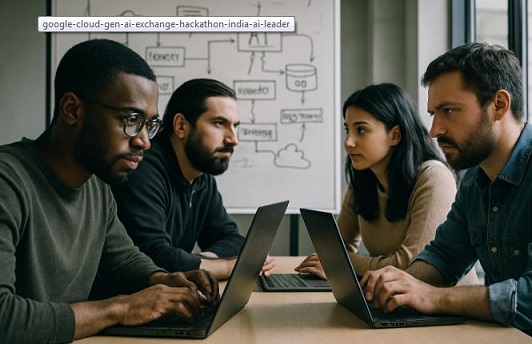Stories you may like
Google Cloud, in partnership with Hack2skill, has announced the second edition of the Gen AI Exchange Hackathon, an initiative aimed at pushing generative AI from experimentation to practical application in India. The hackathon is part of the broader Gen AI Exchange program, which includes the Gen AI Academy and a series of in-person AI Labs designed to equip developers and startups with hands-on skills.
The scale of last year’s edition demonstrated the growing appetite for AI-driven innovation in the country, with over 38,000 registrations, more than 850 solution submissions, and 20+ winners across different categories. Building on that momentum, this year’s hackathon brings expanded mentorship, deeper collaboration with industry bodies, and a sharper focus on problem statements that reflect both pressing social needs and critical industry challenges.
Participants will leverage Google Cloud’s AI stack, including Gemma, Gemini, Vertex AI, and Gemini Code Assist, to design prototypes that address real-world issues. Teams will move through phases of registration, prototype submission, refinement with expert mentorship, and finally, a live showcase before a jury of industry leaders.
Adding to the credibility of the program, this year’s hackathon is being shaped in collaboration with JK Cement, LetsVenture, Nasscom and EaseMyTrip, organisations that represent diverse corners of India’s innovation economy from heavy industry and manufacturing to investment ecosystems and technology advocacy. Their involvement ensures that the problem statements stay relevant and are rooted in challenges that demand scalable, real-world solutions.
Challenges on the table
The problem statements for this year are structured around two tracks: student-focused themes that touch everyday life, and professional challenges rooted in high-impact industry use cases. For students, the hackathon is an opportunity to explore how generative AI can directly improve lives. One challenge centres on youth mental health, asking whether AI can provide confidential, stigma-free wellness support. Another considers India’s artisan economy, inviting solutions that help local craftspeople reach new digital markets and tell their stories online. There is also space for innovation in areas like making legal documents more accessible, building tools to combat misinformation, and developing AI-driven career advisors that map students’ skills to the jobs of tomorrow.
The professional track moves into more specialised domains. In healthcare, participants are tasked with rethinking how test case generation could be automated using AI to meet rigorous compliance demands. In heavy industry, the focus shifts to how cement plant operations can be made more autonomous and sustainable through generative AI, a challenge co-created with JK Cement. “Cement production is incredibly complex, with a constant balancing act between energy use, quality, and environmental impact. We’ve challenged developers to build a solution that can navigate these complexities autonomously, proving that AI can be a powerful driver of both efficiency and sustainability at a massive scale,” said Shantanu Gaur, AI Adoption Lead, MeitY NASSCOM CoE.
And in the investment ecosystem, LetsVenture has contributed to framing a problem around building an AI analyst for startup evaluation, capable of synthesising founder materials and public data into actionable insights for investors. “Investors are drowning in unstructured data. We’ve challenged developers to build an AI analyst that can cut through the noise, evaluate startups like a trained associate, and generate actionable insights at scale. This is a critical problem, and we're eager to see how India's best minds will solve it,” said Shanti Mohan, Founder and CEO, LVX. EaseMyTrip has introduced a challenge around building an AI-powered trip planner that can generate personalised, end-to-end itineraries based on a traveller’s budget, time, and interests, and even book them seamlessly through the travel portal's inventory.
“At EaseMyTrip, our vision has always been to stay ahead of the curve by leveraging technology to make travel smarter, more comfortable, and deeply personalized. Planning a trip that aligns with one’s budget, schedule, and interests is a common challenge and one we’re solving with our AI-powered trip planner. As part of the Gen AI Exchange Hackathon, this innovation will simplify travel planning by using AI to create dynamic, end-to-end itineraries that can adapt in real time and be booked with a single click,” said Rikant Pittie, Co-Founder and CEO, EaseMyTrip. “What truly excites us is to see how the brightest minds of our country will shape next-generation AI solutions that not only transform the travel experience but also strengthen India’s position as a global leader in digital innovation,” he added.
Towards scalable AI for India
The hackathon is open to students, startups, researchers, and IT practitioners across India, with teams of up to five members eligible to participate. Submissions will be judged on innovation, feasibility, scalability, and impact.
To recognise and reward talent, the hackathon will carry prizes for the winning teams. Beyond the financial incentive, the real opportunity lies in testing how generative AI can be deployed against real problems at scale, bridging the gap between lab experimentation and industry adoption. Registrations for the Gen AI Exchange Hackathon are now open. Interested participants can sign up, explore the problem statements, and begin forming their teams.






User's Comments
No comments there.